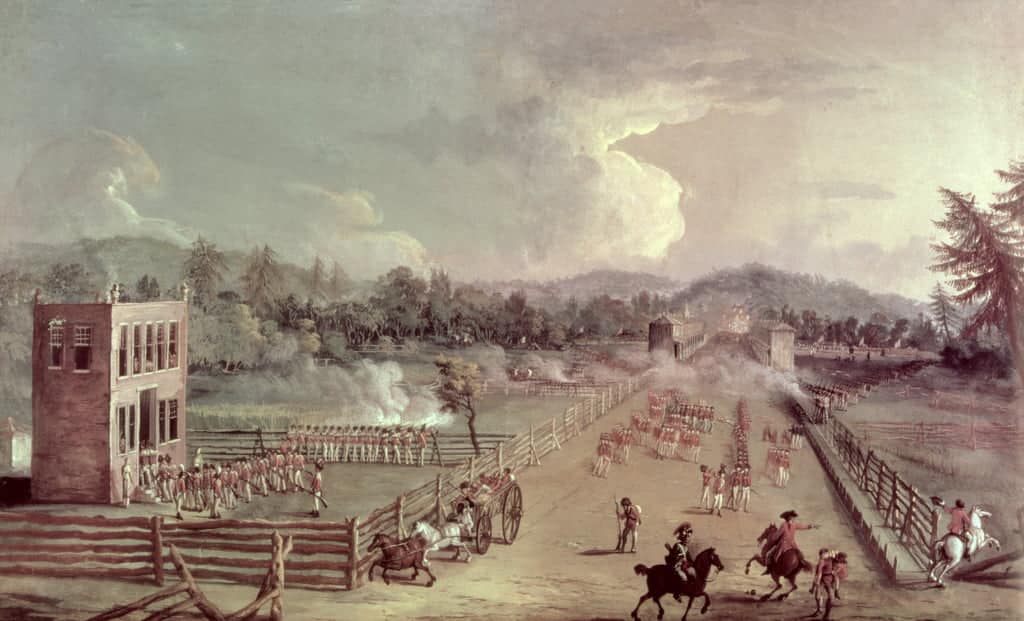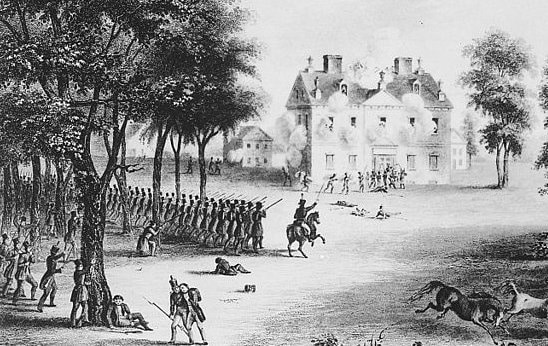The Battle of Germantown: A Turning Point in the American Revolutionary War
The American Revolutionary War, a historical event that shaped the United States as a nation, was punctuated by a series of significant confrontations. One such significant encounter was the Battle of Germantown. This battle, which took place on October 4, 1777, in Germantown, Pennsylvania, marked a pivotal moment in the Philadelphia campaign of the American Revolutionary War. Although the battle resulted in a British victory, it had far-reaching implications that impacted the course of the war and the ultimate formation of the United States.
Prelude to the Battle
In September 1777, the British Army, under the command of General Sir William Howe, had successfully captured Philadelphia, the then capital of the United States. Following this victory, Howe deployed two brigades, led by General James Grant, and a contingent of Hessian troops, commanded by General Wilhelm von Kynphausen, in Germantown, a northwestern suburb of Philadelphia. This force constituted a total of 9,000 troops.
On the American side, General George Washington led an army consisting of 8,000 Continental soldiers and 3,000 militiamen. Sensing an opportunity to strike a significant blow to the British, Washington decided to attack the enemy detachment at Germantown. His plan was to employ a double envelopment strategy, a complicated military maneuver that required precise coordination and communication among the troops.
The American Plan and its Execution
Washington set his plan in motion on the night of October 3, 1777. Mimicking his successful tactics at Trenton, he divided his army to attack the British from multiple directions simultaneously at dawn. The primary force under General John Sullivan was to launch the main attack, while General Nathanael Greene’s troops were to flank the enemy. The militia, led by General William Smallwood, was tasked with targeting the British’s extreme right and rear.
However, the American plan did not go as smoothly as Washington had hoped. A combination of darkness and heavy fog delayed the advance and cost the Americans the element of surprise. This resulted in a series of unforeseen events that ultimately led to the American defeat.

The Battle Unfolds
Sullivan’s column was the first to engage, driving back the British pickets on Mount Airy. However, some British forces, including 120 men under British Colonel Musgrave, barricaded themselves in the stone house of Chief Justice Benjamin Chew, known as Cliveden. Despite multiple assaults, the Americans were unable to dislodge the British from this fortified position, suffering heavy casualties in the process.
Meanwhile, one of Sullivan’s divisions, commanded by General Anthony Wayne, became separated in the fog. A brigade from Greene’s column, under General Adam Stephen, also lost its way in the fog and mistook Wayne’s men for the enemy, leading to a friendly fire incident. The resulting confusion and chaos led both units to retreat from the field.
Aftermath of the Battle
Despite the British victory, the Battle of Germantown had significant implications. The British suffered more than 500 casualties, a substantial number considering the size of their force. On the American side, about 700 men were killed or wounded, and another 400 were captured.
More importantly, the Battle of Germantown had profound strategic consequences. While the British had won the battle, General Howe failed to capitalize on his victory by allowing Washington’s army to escape. This decision allowed the Continental Army to regroup and continue the fight.
Impact on the War
The Battle of Germantown demonstrated the resilience and determination of the American forces, which left a lasting impression on the Europeans, particularly the French. Despite the defeat, the French, already impressed by the American victory at Saratoga, decided to lend greater aid to the Americans. This support was instrumental in the American victory in the Revolutionary War.
The Battle of Germantown, although a tactical defeat for the Americans, played a crucial role in shaping the course of the American Revolutionary War. It showcased the tenacity and resolve of the American forces and played a significant part in securing French support for the American cause. This battle serves as a reminder that even in defeat, there can be strategic victories that have far-reaching implications.
